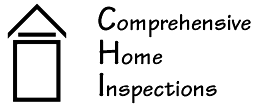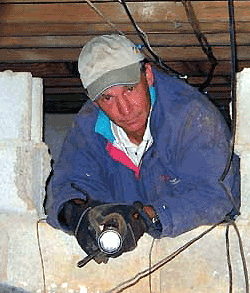![[Image]](../images/small-facade.gif)
If you have more questions, please email me.
Why purchase a home inspection?
An inspector observes and reports about the function and safety of a home.He provides a general overview of the property and recommends more detailed review by specialists (electricians, engineers, etc.) if needed. He determines whether the condition of the home is good, fair, or poor in relation to comparable homes.
How is a home inspection organized?
The house and grounds are arranged into systems. About 3 hours are spent inspecting the house, preferably with the homebuyer attending. This is a good time for the buyer to take a longer, more detailed look at the home. Home inspections provide an impartial review allowing the homebuyer to make an informed decision regarding a home purchase.
Do I need an inspection when buying a new home?
The tremendous growth of metro Atlanta has strained the ability of city and county governments to fully evaluate new construction. Private inspectors provide disinterested third-party review of new construction. New home construction inspections are generally divided into phases as the home is built. See “Inspector’s Lament” at this web site.
How much does a home inspection cost?
Fees for most single-family homes range from 350-500$, condominimums and townhomes 250-350$. Additional fees may apply depending upon travel, the price and size of the home.
There are many other inspectors who charge less than Comprehensive Home Inspections just as there are other services for which prices vary. If you are looking for the lowest cost please do not waste our time, visit links to inspection association websites.
See more about fees here.
When and how is the inspection report delivered?
Typically within 24-36 hours. This allows the inspector time review field observations, perform research and write the report. Reports are emailed using non-tamperable PDF format. Acrobat reader 7.0 is required to open the report document.
How does the report fit into the home-buying process?
When a standard real estate contract is agreed upon the buyer is allowed to have an inspector of his choice inspect the property. Upon receipt of the inspection report, the homebuyer may decide to request the seller to make repairs to the home.
An addendum to the contract requesting repairs or improvements is then delivered to the seller. Negotiations between the parties ensue until an agreement is reached. The inspector’s job is to inform the homebuyer, not to make any contractual decisions. It is the homebuyer’s responsibility to determine which defects disclosed on the inspection warrant action on the part of the seller.
If repairs are needed who performs the work?
The Code of Ethics for both the state and national organizations, GAHI AND ASHI, require that the inspector not have a financial interest in any repairs or improvements addressed on the inspection report unless that interest is disclosed to all parties. The inspector may provide names of tradesmen or professionals provided the inspector has no financial interest in their receiving work from the homebuyer.
What is, and is not “covered” in the inspection report?
Major and/or immediate defects in the function and safety of the home.
Repair and maintenance defects which affect function and safety are included.
The inspector may include comments regarding the age of the components.
For new construction and renovations building code and other construction standards may be included.
The inspection is limited to the readily visible portions of the home.
No plan review, load calculations or other technically exhaustive evaluations are made unless specifically agreed to by all parties. The inspection is by definition a brief overview. Cosmetic details are not covered: these areas should be reviewed by the homebuyer.
The inspector does not provide repair cost estimates. Prices vary considerably throughout the Metro Atlanta area. It is a good idea to obtain several bids before choosing a company or service.
Low voltage wiring, sprinkler systems, septic tanks, and other components are not usually covered. Review the Scope of Service portion of the inspection report for full details.
What if I am not satisfied or wish to file a complaint? If you are unhappy with the service let me know. I cannot respond if you don't let me know you are not satisfied. Allow me to view the defect before it is repaired or replaced: if I determine that I am culpable I will refund the inspection fee. You may also file a complaint with the American Society of Home Inspectors (ASHI) of which I am a member. Visit the site of the Southeast Chapter at www.homeinspectors.org. for more information.
Does an inspection report cover energy use?
Not specifically. Energy standards enacted in 1993, along with federal requirements for minimum equipment efficiencies have improved the overall performance of homes. Energy code is the least understood and enforced building standard. Builders are just beginning to understand their impact regarding mold, comfort, and moisture. Read the article "Why Don't They Build Houses Like They Used To" at this site.
What are my inspector’s qualifications and experience?
See the Certifications and References section of this website.
If you have more questions, please email me.
What parts of the home does an inspection cover? How do inspections fit into the home-buying process? Find the answers to these and other questions or ask your own.
![[Image]](../images/small-facade.gif)

